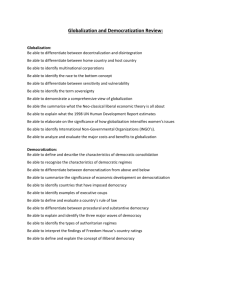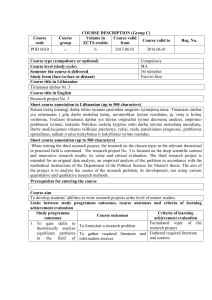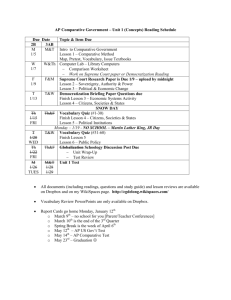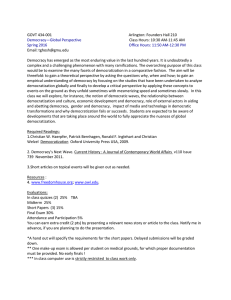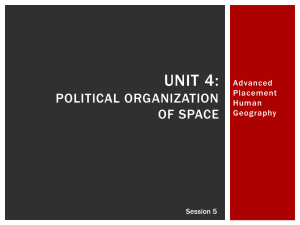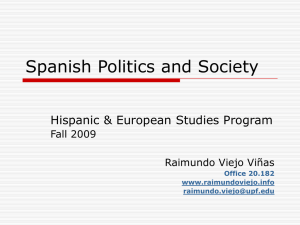Human Rights and Democratization
advertisement
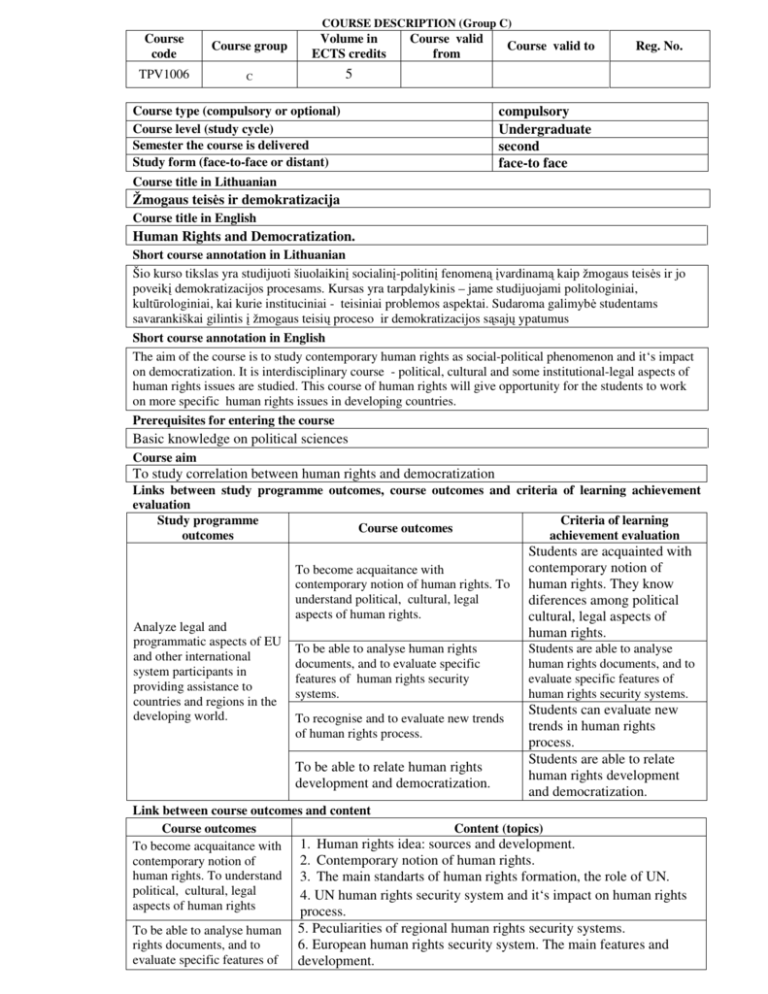
COURSE DESCRIPTION (Group C) Course code Course group Volume in ECTS credits TPV1006 C 5 Course valid from Course type (compulsory or optional) Course level (study cycle) Semester the course is delivered Study form (face-to-face or distant) Course valid to Reg. No. compulsory Undergraduate second face-to face Course title in Lithuanian Žmogaus teisės ir demokratizacija Course title in English Human Rights and Democratization. Short course annotation in Lithuanian Šio kurso tikslas yra studijuoti šiuolaikinį socialinį-politinį fenomeną įvardinamą kaip žmogaus teisės ir jo poveikį demokratizacijos procesams. Kursas yra tarpdalykinis – jame studijuojami politologiniai, kultūrologiniai, kai kurie instituciniai - teisiniai problemos aspektai. Sudaroma galimybė studentams savarankiškai gilintis į žmogaus teisių proceso ir demokratizacijos sąsajų ypatumus Short course annotation in English The aim of the course is to study contemporary human rights as social-political phenomenon and it‘s impact on democratization. It is interdisciplinary course - political, cultural and some institutional-legal aspects of human rights issues are studied. This course of human rights will give opportunity for the students to work on more specific human rights issues in developing countries. Prerequisites for entering the course Basic knowledge on political sciences Course aim To study correlation between human rights and democratization Links between study programme outcomes, course outcomes and criteria of learning achievement evaluation Study programme Criteria of learning Course outcomes outcomes achievement evaluation Analyze legal and programmatic aspects of EU and other international system participants in providing assistance to countries and regions in the developing world. To become acquaitance with contemporary notion of human rights. To understand political, cultural, legal aspects of human rights. Students are acquainted with contemporary notion of human rights. They know diferences among political cultural, legal aspects of human rights. To be able to analyse human rights documents, and to evaluate specific features of human rights security systems. Students are able to analyse human rights documents, and to evaluate specific features of human rights security systems. To recognise and to evaluate new trends of human rights process. To be able to relate human rights development and democratization. Students can evaluate new trends in human rights process. Students are able to relate human rights development and democratization. Link between course outcomes and content Course outcomes Content (topics) To become acquaitance with 1. Human rights idea: sources and development. 2. Contemporary notion of human rights. contemporary notion of human rights. To understand 3. The main standarts of human rights formation, the role of UN. political, cultural, legal 4. UN human rights security system and it‘s impact on human rights aspects of human rights process. To be able to analyse human rights documents, and to evaluate specific features of 5. Peculiarities of regional human rights security systems. 6. European human rights security system. The main features and development. human rights security systems To recognise and to evaluate new trends of human rights process. 7. Impact of human rights process on international relations. 8. The global civil society and human rights. The role of NGO‘s. 9.Problems of human rights impementation. Universalism and cultural relativism. 10. The insufficiency of individualistic notion of human rights. 11. Global economy and human rights. 12. Human rights and migration. To be able to relate human 13. Human rights process in Lithuania. rights development and 14. Human rights implementation - the main condition of developing democratization countries democratization. Study (teaching and learning) methods Teaching methods: lecturing, expanation, consultations; Study methods: scientific literature studies, home work presentations, discussions. Methods of learning achievement assessment Discussions, home work presentations, essay evaluation. Distribution of workload for students (contact and independent work hours) Lectures-discussions – 30 h, paper work – 15 h, work in groups – 15 h, individual work – 60 h Structure of cumulative score and value of its constituent parts Midterm exam – 25 percent, home work presentation – 25 percent, final exam - 50 percent of total grade. Recommended reference materials No. Publication year Authors of publication and title Publishing house University library Number of copies in Self-study Other rooms libraries Basic materials 1. 2009 2. 2001 Goodhart M. (Ed.) Human Rihhts. Politics and Practice Hayden P. (Ed.) The philosophy of human rights. 1989 Laquaeur W. and Rubin B. (Eds.) The human rights reader 3. 4. 1997 Micheline R. Ishay.(Ed) The human rights reader. Major political essays, speeches and documents from the Bibble to the present Oxford University press Paragon House 1 Routledge 1 5. 2000 6. 1999 Alston P. H. (Ed.) The EU and Human rights Oxford University press 2011 Hammarberg T. Human rights in Europe: no grounds for complacency Strasbourg: Council of Europe 1 1 Penguin Books Steiner H. J. Alston P. H. International human rights in context. Law, politics, morals 7. 1 1 Oxford University press 1 1 Course programme designed by Prof. Regina Jasiuleviciene, dr. Robert van Voren 1
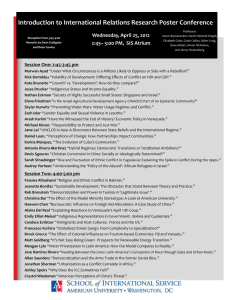

![how-question strong incentives and means to block [the process] relational-mechanisms:](http://s2.studylib.net/store/data/011168808_1-1a3c3acbd5e45945bbd2cdde19d0f42f-300x300.png)

